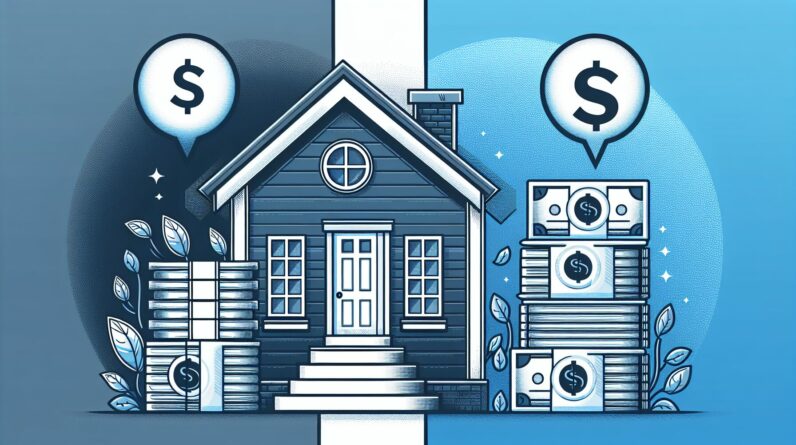
Have you ever wondered if mortgages and home loans are the same thing? It’s a common misconception that these two terms are interchangeable, but in fact, they have distinct differences. While both involve borrowing money to purchase a home, a mortgage refers to the loan itself, while a home loan encompasses the entire financial process of buying a property. Understanding this distinction is crucial when navigating the complex world of real estate and financing. Let’s explore further to clarify any confusion and help you make informed decisions when it comes to your housing aspirations.
Table of Contents
What is a mortgage?
A mortgage is a type of loan specifically used for purchasing a property. It is a legal agreement between a borrower and a lender, where the borrower uses the property as collateral in exchange for funds to purchase the property. The borrower agrees to repay the loan over a predetermined period, typically with added interest.
Definition
A mortgage is a loan provided by a financial institution or lender to help individuals or families purchase a property. It is a legal agreement that outlines the terms and conditions of borrowing money to finance the purchase of a home.
Purpose
The purpose of a mortgage is to enable individuals or families to afford a property that they may not have enough cash on hand to purchase outright. It provides the opportunity to become a homeowner without having to save up the entire purchase price of the property.
Process
The process of obtaining a mortgage involves several steps. Firstly, you would need to find a potential lender and submit an application. The lender will then review your financial information, credit history, and employment status to assess your eligibility. If approved, the lender will determine the loan amount, interest rate, and repayment terms. After these terms are agreed upon, the mortgage is secured by the property and the funds are disbursed.
Types of mortgages
There are various types of mortgages available to borrowers, each with its own features and benefits. Some common types include fixed-rate mortgages, adjustable-rate mortgages, government-backed mortgages (such as FHA loans or VA loans), and interest-only mortgages. The type of mortgage you choose will depend on your personal financial situation and preferences.
Interest rates
Mortgages often come with interest rates, which determine the cost of borrowing the money for your home purchase. The interest rate may be fixed, meaning it remains the same throughout the loan term, or adjustable, meaning it can change over time based on market conditions. It is essential to compare interest rates from different lenders to ensure you secure the most favorable terms.
Repayment terms
The repayment terms of a mortgage outline the schedule for repaying the borrowed funds. This typically includes the length of the loan (such as 15 or 30 years) and the frequency of payments (monthly, biweekly, etc.). The repayment terms will also specify whether the loan is fully amortizing, meaning the principal and interest are paid off by the end of the term, or if there is a balloon payment due at the end of the loan term.
Benefits
There are several benefits to obtaining a mortgage. Firstly, it allows individuals and families to become homeowners without saving up a substantial amount of money. Additionally, mortgages may provide tax benefits, such as deductible interest. Moreover, owning a property can potentially build equity, providing a long-term financial asset.
Considerations
While mortgages offer various benefits, there are several considerations to keep in mind. It is crucial to carefully assess your financial situation to ensure you can afford the monthly mortgage payments. Additionally, you should consider the total cost of the loan, including interest and fees. Understanding the terms and conditions of the mortgage, such as prepayment penalties or adjustable rates, is also essential before entering into a mortgage agreement.
What is a home loan?
A home loan is another term commonly used to refer to the same financing concept as a mortgage. In essence, a home loan is a loan provided by a lender to assist individuals or families in purchasing a home. Like a mortgage, it is a legal agreement with specific terms and conditions.
Definition
A home loan is a loan offered by a financial institution or lender to facilitate the purchase of a property. It functions similarly to a mortgage, where the borrower agrees to repay the loan over a specified period, usually with interest.
Purpose
The purpose of a home loan aligns with that of a mortgage: to provide financial assistance to individuals or families who want to buy a home but do not have the full purchase price readily available. It allows borrowers to spread out the cost of the home over time, making homeownership more attainable.
Process
The process of obtaining a home loan is similar to that of a mortgage. Borrowers must apply for the loan, provide the necessary financial information, and undergo a review process by the lender. Once approved, the lender will determine the loan amount, interest rate, and repayment terms. Funds are then disbursed, allowing the borrower to purchase the desired property.
Types of home loans
Similar to mortgages, home loans come in various types to cater to different borrower needs. These may include conventional home loans, government-backed home loans, jumbo loans for higher-value properties, and specialty loans for specific purposes. Each type of home loan has its own eligibility criteria and features to consider when making a decision.
Interest rates
Interest rates play a significant role in home loans, affecting the overall cost of borrowing. Lenders may offer fixed interest rates or adjustable rates, depending on the borrower’s preferences and market conditions. It is essential to compare interest rates from different lenders to secure the most favorable terms for your home loan.
Repayment terms
The repayment terms for home loans typically involve the length of the loan and the frequency of payments. Loans can span various periods, such as 15, 20, or 30 years. Additionally, borrowers have the option to choose between monthly, biweekly, or other payment frequencies. Understanding and comparing repayment terms can help borrowers find the best fit for their financial situation.
Benefits
Home loans offer similar benefits to mortgages, as they are essentially the same financing tool with different terminology. They provide a pathway to homeownership for individuals who cannot afford to buy a property outright. The ability to build equity, potential tax benefits, and the opportunity to create a stable living environment are all advantages of obtaining a home loan.
Considerations
Potential borrowers should consider factors such as their ability to afford the monthly payments, the total cost of the loan, and any potential fees or penalties associated with the home loan. It is crucial to carefully assess your financial situation and consider future plans before committing to a home loan.

Key Similarities
Definition
Both mortgages and home loans share the same fundamental definition: they are loans provided by lenders to assist individuals or families in purchasing a property. The terms “mortgage” and “home loan” are often used interchangeably to refer to this type of financing.
Purpose
The purpose of both mortgages and home loans is to enable borrowers to become homeowners by providing financial assistance for purchasing a property. Both financing options allow individuals or families to spread out the cost of the home over time, rather than paying the full purchase price upfront.
Secured by property
Both mortgages and home loans are secured by the property being purchased. This means that the lender has a legal claim to the property as collateral until the loan is fully repaid. If the borrower fails to meet the agreed-upon repayment terms, the lender may have the right to foreclose on the property to recoup their investment.
Interest rates
Both mortgages and home loans involve interest rates, which determine the cost of borrowing the funds. Whether it is a fixed rate or adjustable rate, the interest rate affects the overall amount the borrower will repay over the life of the loan.
Repayment terms
Mortgages and home loans both have specified repayment terms that outline how the borrowed funds will be repaid. These terms include the length of the loan and the frequency of payments, ensuring that borrowers have a clear plan for meeting their financial obligations.
Key Differences
Terminology
The primary difference between mortgages and home loans lies in the terminology used to describe the financing option. Different regions or countries may predominantly use one term over the other, but they refer to the same concept of borrowing money to purchase a property.
Lenders
While both mortgages and home loans can be obtained from various financial institutions or lenders, the specific lenders available may differ. Some lenders may specialize in mortgages, while others focus on providing home loans. It is important to research and compare lenders to find the best fit for your needs.
Borrowing limits
Mortgages and home loans may have different borrowing limits, depending on the lender and the borrower’s financial situation. In some cases, mortgages may have higher borrowing limits, as they are often used for more substantial property purchases. Home loans, on the other hand, may have varying limits based on the lender’s policies.
Eligibility criteria
The eligibility criteria for mortgages and home loans can also differ. Lenders may have specific requirements, such as minimum credit scores, income levels, or employment history, to qualify for their loan programs. It is essential for borrowers to understand and meet the eligibility criteria for their chosen financing option.
Use of funds
While mortgages and home loans are primarily used for purchasing a property, the specific use of funds may differ. Mortgages are commonly associated with primary residences, whereas home loans may encompass a broader range of property types, including second homes or investment properties.
Approval process
The approval process for mortgages and home loans can vary based on the lender and the borrower’s financial profile. Some lenders may have more stringent approval processes or require additional documentation. It is important to be prepared for the specific requirements of the lender you choose to work with.
Loan structures
Loan structures can vary between mortgages and home loans. Each financing option may have different repayment structures, such as fully amortizing loans or interest-only loans. Loan structures can impact the overall cost and repayment timeline, so it is crucial to understand the structure of your chosen loan.
Tax implications
Tax implications can differ between mortgages and home loans, depending on the country or region. In some areas, mortgage interest payments may be tax deductible, providing potential tax benefits for homeowners. It is essential to consider the tax implications associated with your financing option and consult with a tax professional if needed.

Choosing Between a Mortgage and a Home Loan
Choosing between a mortgage and a home loan depends on your specific objectives and financial situation. The following steps can help guide your decision-making process:
Consider your objectives
Think about your goals, both in the short term and long term. Consider factors such as the type of property you are looking to purchase, your long-term plans for the property, and your overall financial objectives.
Evaluate your financial situation
Assess your financial standing, including your income, expenses, and savings. Determine how much you can comfortably afford for monthly mortgage payments and any associated costs, such as property taxes and insurance.
Assess lending options
Research and compare the lending options available to you. Consider factors such as interest rates, repayment terms, fees, and eligibility requirements. Take the time to get quotes or pre-approvals from multiple lenders to ensure you are making an informed decision.
Compare interest rates and repayment terms
Compare interest rates and repayment terms from different lenders to find the option that best fits your financial situation. Consider whether a fixed-rate mortgage or an adjustable-rate mortgage would be more suitable for your needs.
Consult a financial advisor
Seek guidance from a financial advisor or mortgage professional who can provide personalized advice based on your specific situation. They can help you navigate the decision-making process and provide insight into the long-term financial implications of your choice.
Misconceptions About Mortgages and Home Loans
Thinking they refer to different financing options
One common misconception about mortgages and home loans is that they are two different financing options. In reality, they refer to the same concept of borrowing money to purchase a property, with different terminology used in different regions or countries.
Confusion regarding terminology
The terminology used for mortgages and home loans can cause confusion. It is important to understand that the terms “mortgage” and “home loan” are often used interchangeably and refer to the same financing tool.
Believing one is better than the other
Another misconception is that one option, whether it be a mortgage or a home loan, is inherently better than the other. The suitability of each option depends on individual circumstances, financial goals, and preferences.

Frequently Asked Questions
Can I use the terms mortgage and home loan interchangeably?
Yes, the terms mortgage and home loan can be used interchangeably. They both refer to the same concept of borrowing money to finance the purchase of a property.
What factors affect the interest rate of a mortgage or home loan?
Several factors can influence the interest rate of a mortgage or home loan. These factors include the borrower’s credit score, income, loan amount, loan term, and prevailing market conditions.
What are the common eligibility criteria for obtaining a mortgage or home loan?
Common eligibility criteria for mortgages and home loans may include minimum credit score requirements, income verification, employment history, and proof of financial stability. These criteria can vary between lenders.
How do mortgage and home loan repayments work?
Mortgage and home loan repayments typically involve a fixed monthly payment made to the lender, which includes both principal and interest. The payments are spread out over the loan term until the loan is fully repaid.
What happens if I default on my mortgage or home loan?
If you default on your mortgage or home loan, the lender may take legal action to recover their investment. This can include foreclosure, where the lender takes possession of the property to sell it and recoup their losses.
Can I repay my mortgage or home loan early?
In most cases, borrowers have the option to repay their mortgage or home loan early. However, it is essential to review the terms of your loan agreement, as there may be prepayment penalties or other limitations.
Can I refinance my mortgage or home loan?
Yes, refinancing a mortgage or home loan is possible. Refinancing involves obtaining a new loan to replace the existing one, often with better terms, lower interest rates, or a different loan structure. It is important to evaluate the costs and potential benefits before refinancing.
Conclusion
In conclusion, mortgages and home loans are terms used interchangeably to describe the same concept: borrowing funds to purchase a property. They both serve the purpose of enabling individuals or families to become homeowners. While there may be differences in terminology, eligibility criteria, and loan structures, the fundamental objective remains consistent. Choosing between a mortgage and a home loan requires careful consideration of personal goals, financial capabilities, and available lending options. By understanding the similarities and differences, considering your objectives, evaluating your financial situation, and consulting with professionals, you can make an informed decision and successfully navigate the process of financing your dream home.








